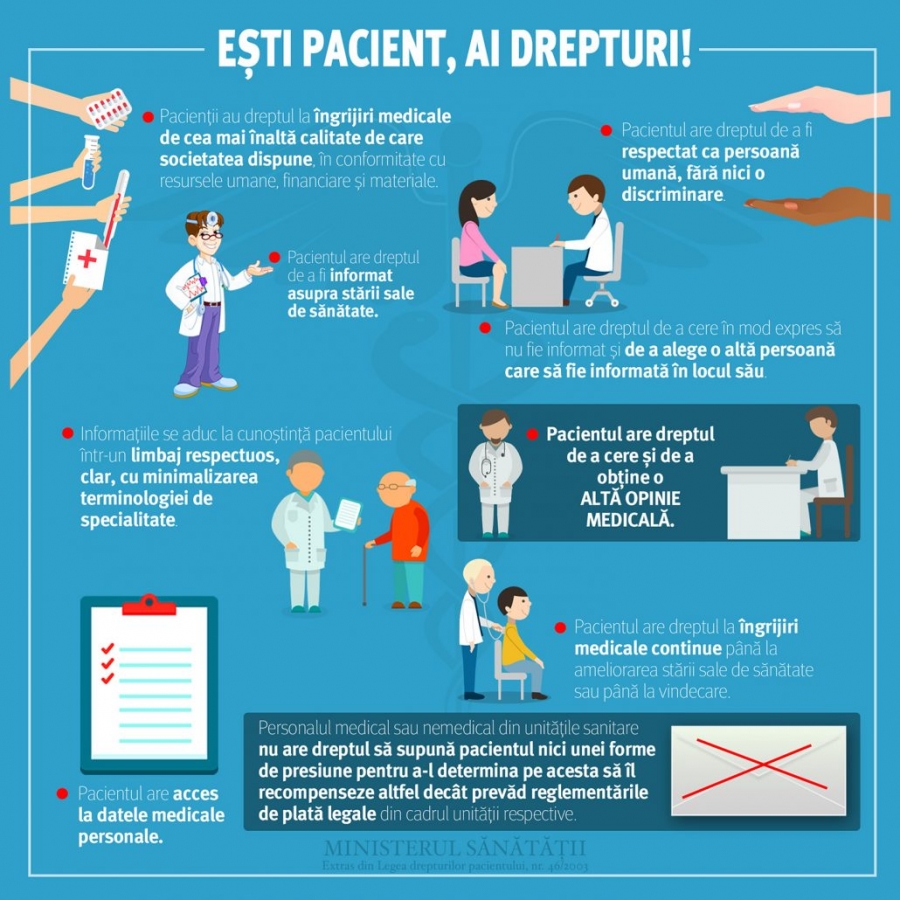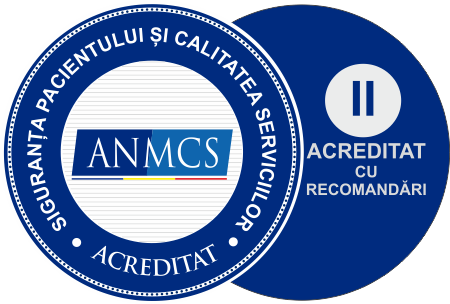Patients’ Rights
Chap.1 General Provisions
1. For the purposes hereof:
a) patient shall mean the healthy or ill person using the healthcare services;
b) discrimination shall mean the different treatment applied to persons who are in similar situations on the basis of the race, gender, age, ethnicity, national or social origin, religion, political options or personal antipathy;
c) healthcare shall mean the medical and community services, and the services ancillary to the medical act;
d) medical intervention shall mean any examination, treatment or other medical act having as a purpose the preventive or therapeutic diagnosis or the rehabilitation;
e) terminal care shall mean the healthcare provided to a patient using the available treatment means, when the fatal prognosis of the disease can no longer be improved, as well as the care provided immediately prior to the decease.
2. Patients shall be entitled to the highest quality medical services available, according to the human, financial and material resources.
3. The patient shall be entitled to be treated as a human being, without any discrimination.
Chap. 2 The patient’s right to medical information
1. The patient shall be entitled to be informed on the available medical services, as well as on the way in which they can be accessed.
2. The patient shall be entitled to be informed on the identity and professional standing of the healthcare providers. Patients admitted in the hospital shall be entitled to be informed on the rules and practices they must observe during their stay in the hospital.
3. The patient shall be entitled to be informed on their health condition, on the proposed medical interventions, on the potential risks associated to each procedure, on the available alternatives to the proposed procedures, including on the risks incurred in case the treatment is not performed and the medical recommendations are not observed, as well as on the diagnosis and prognosis data.
4. The patient shall be entitled to decide if the information provided by the doctor would cause them suffering.
5. The information shall be communicated to the patient in a respectful, clear language, using as little specialized terminology as possible; if the patient does not speak Romanian, the information shall be provided in the mother tongue or in a language they do speak or, as applicable, a different form of communication shall be sought.
6. The patient shall be entitled to expressly request not to be informed or to appoint another person who is informed on their behalf. The patient’s relatives and friends may be informed on the evolution of the investigations, diagnosis and treatment, with the patient’s consent.
7. The patient shall be entitled to request and obtain another medical opinion.
8. The patient shall be entitled to request and receive, upon the dismissal from the hospital, a written summary of the investigations, of the diagnosis, treatment and care provided during the hospitalization.
Chap.3 CPatient’s consent regarding the medical investigation
1. The patient shall be entitled to refuse or interrupt a medical investigation, undertaking written liability for such decision; the patient shall be informed on the consequences of such refusal or interruption of the medical acts.
2. In case the patient is unable to express his/her will, but an emergency medical intervention is required, the medical personnel shall be entitled to infer the patient’s consent based on the previous expression of their will.
3. In case the patient requires an emergency medical intervention, the legal representative’s consent no longer is required.
4. In case the legal representative’s consent is required, the patient shall be involved in the decision-making process, to the extent permitted by their understanding ability.
5. In case the medical service providers believe that the intervention is to the patient’s benefit, and the legal representative refuses to express his/her consent, the decision shall be forwarded to a specialized arbitration board. The arbitration board shall be made up of 3 physicians for hospital-admitted patients and of 2 physicians for the patients in outpatient clinics.
6. The patient’s consent shall be mandatorily obtained for the collection, maintenance, use of all biological products sampled from their body, in order to set the diagnosis or treatment the patient agrees to.
7. The patient’s consent shall be mandatorily obtained for the participation in the clinical medical studies and scientific researches. Persons who are unable to express their will cannot participate in scientific researches, unless the legal representative’s consent is obtained and unless the research is performed in the patient’s interest.
8. All pictures or video recordings of the patient in a medical unit shall require their consent, except if the images are required for diagnosis and treatment purposes and in order to prevent malpractice suspicions.
Chap.4 The patient’s right to data confidentiality and private life
1. All the information regarding the patient’s condition, the results of the investigations, the diagnosis, prognosis, treatment, personal data shall be confidential even after the patient’s decease.
2. Confidential information may only be disclosed if the patient expresses his/her explicit consent or if expressly demanded under the law.
3. In case other accredited medical service providers involved in the patient’s treatment require such information, the obtaining of the consent no longer is mandatory.
4. The patient shall have access to personal medical data.
5. Any and all intrusion in the patient’s private, family life is forbidden, unless such interference positively influences the diagnosis, treatment or care granted and only with the patient’s consent. The cases in which the patient is a danger for self or for public health are regarded as exceptions.
Chap.5 Patient’s rights with regards to reproduction
1. The woman’s right to life shall prevail in case the pregnancy is a major and immediate risk for the mother’s life.
2. The patient shall be entitled to information, education and services required for the development of a normal sexual life and the health of reproduction, without any discrimination.
3. The woman’s right to decide whether she wants to have children or not is guaranteed, except for the situation stipulated in art. 26. The patient shall be entitled to choose the safest reproduction health methods in the provision of the healthcare services. Any and all patients shall be entitled to efficient and safe family planning methods.
Chap. 6 The patient’s right to treatment and medical care
1. If providers are bound to resort to patient selection for certain types of treatments that are available in a limited number, the selection shall be performed on the basis of the medical criteria only.
2. The medical criteria regarding the patients’ selection for certain types of treatment shall be established by the Ministry of Health and Family within 30 days as of the enforcement hereof and shall be communicated to the public.
3. The medical interventions on the patient can only be performed if the required equipment and the accredited medical personnel are available. The provisions in para (1) shall not apply in the cases of emergencies occurred in extreme situations.
4. The patient shall be entitled to terminal care so that their right to die with dignity is observed.
5. The patient may benefit from the support of the family, friends, of spiritual and material support and of advice throughout the medical care. Upon the patient’s request, depending on the possibilities, the care and treatment environment shall be as close as possible to the family one.
6. The admitted patient shall also be entitled to the medical services of an accredited physician from outside the hospital.
7. The medical or non-medical personnel in the healthcare units shall not be entitled to subject the patient to any form of pressure to determine them to provide a different form of compensation than the one established under the legal payment regulation applicable to the respective unit. The patient may offer the employees or the units where the care was provided additional payments or donations, according to the law.
8. The patient shall be entitled to continuous medical care until their health condition improves or until they are healed. The continuous healthcare shall be provided through the collaboration and partnership amongst the various specialty or general practice public and non-public hospital and outpatient clinic units, provided by physicians, nurses or other qualified personnel. After dismissal, patients shall be entitled to the available community services.
9. The patient shall be entitled to benefit from 24/7 emergency medical care, emergency dental care and pharmaceutical services.
Patient’s obligations
I. Pursuant to the patient’s rights law no. 46/2003, para 5, art. 2, (patients admitted in the hospital shall be entitled to be informed on the rules and practices they must observe during their stay in the hospital), within Laurus Medical, patients have the following obligations:
- to observe the internal clinic regulations;
- to maintain the premises orderly, clean and not to disturb the peace and tranquillity in the facility;
- not to damage the assets within the clinic;
- to observe the functional circuits;
- to strictly observe the physician’s therapeutic recommendations during the admission period;
- not to leave the clinic without approval for extra medical problems; in case they receive a leave of absence, not to exceed the granted time;
- to maintain and hand over the clinic’s equipment in proper condition;
- to behave civilly towards the medical and sanitary personnel;
- not to introduce and consume alcoholic beverages on the premises of the clinic.
According to the provisions in the Law no. 15/2016 amending and supplementing Law no. 349/2002 on the prevention and countering of tobacco consumption, the consumption of tobacco products is forbidden on the premises of Laurus Medical. This provision is mandatory for both the medical personnel and the patients, the caregivers, as well as any other persons present in the clinic. The failure to observe this provision is an offense and shall be sanctioned with a fine of RON 100-500 for natural persons and with a fine of RON 5,000-15,000 for legal entities.





